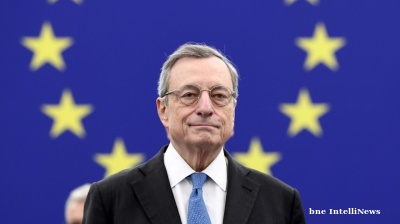Almost a year after the controversial merger with a leading outdoor advertising firm, Russia’s leading e-commerce site Wildberries is indulging in a fresh bout of eyebrow raising deals.
The founder of the company and Russia’s richest woman, Tatiana Kim (nee Bakalchuk) who held 99% in the company, was rocked by controversy after she agreed to a merger deal with Russ Group, an outdoor advertising operator that was much smaller than her online retail giant, the largest retailer in Russia of any kind at the time.
“It’s not a takeover, but a divorce,” Kim said at the time, before she separated from her husband, co-founder and the owner of the remaining one% of the company, Vladislav Bakalchuk.
Russian President Vladimir Putin gave his personal approval for the deal, which analysts have been struggling to understand as Russ is ten-times smaller than Wildberries, will invest no money in the company and brings little obvious economic benefit to the e-commerce’s platform.
Russ is linked to billionaire Suleiman Kerimov of Polyus Gold and veteran technocrat Igor Shuvalov, who is one of Putin’s right-hand men and heads up the state investment company VEB.
The deal quickly soured with Bakalchuk turning to Chechen President Ramzan Kadyrov for help, who has no obvious connection to the e-commerce business. Things got really crazy when two people were killed in a shootout as Vladislav tried to storm the company’s offices in the heart of Moscow. The Russian media largely ignored the incident reminiscent of the racketeering raids of the “wild 90’s”, and no public trial was ever held.

Wildberries founder Tatyana Kim (nee Bakalchuk) is Russia’s richest women after building up the e-commerce giant Wildberries, but agreed to a merger with much smaller outdoor advertising company Russ last year and has now embarked on a series of strange acquisitions.
M&A jamboree
Now the company is doing a raft of deals that also appear to have little business logic. Some analysts speculated that the company is being pumped up ahead of a potential sale or listing. This year it has expanded into airports, cosmetics, tourism, postal services and even taxis—despite signs of slowing growth and rising questions over its long-term strategy.
The first purchase of the combined Wildberries & Russ (OOO RVB) was announced in September. Wildberries and its merged entity Russ Group, operating under OOO RVB, have finalised a series of seemingly unconnected deals, acquiring 100% of Ingushetia’s Magas Airport. In early October it bought the Rive Gauche cosmetics chain, major tour operator Fun&Sun, in mid-October a stake in Uzbekistan’s postal service UzPost, (the terms of the deal are unknown, but a 29.4% stake was put up for sale), and the advertising operator for Kazan’s metro system, The Bell reports. Last week, it was revealed that Russ also acquired Barsrekart, the Kazan metro's advertising operator.
Rive Gauche's revenue last year amounted to RUB37.4bn rubles, with a net loss of RUB1.5bn rubles. In theory, the acquisition could help the marketplace gain a foothold in the premium cosmetics segment, analysts predicted.
Fun&Sun revenue in 2024 was RUB104bn rubles, with net profit at RUB5bn rubles.
UzPost is worth RUB2bn rubles, has more than 1,600 branches and thousands of delivery points that could be used for Wildberries own pickup points across the country. Uzbekistan is Wildberries second largest market after Russia after entering the market in 2022 and plans to spend hundreds of millions of dollars on new infrastructure.
Wildberries' likely next big deal is the acquisition of Citymobil, once Russia's second-largest taxi aggregator after YandexTaxi. Sberbank and VK invested tens of billions of rubles into the company before a corporate war broke out and Citymobil nearly closed down during negotiations to sell the business. In April 2022, the remains of the company were sold to the investment company People&People, founded by St. Petersburg businessman Igor Rudziy, owner of the transport company Gruzovichkof.
Kim has been eyeing the taxi business for a while. This summer, Wildberries began testing its own taxi booking service in Belarus, and in August, the WB Taxi division was headed by well-known market manager Anatoly Smorgonsky—the former head of Russia's Gett and the aggregator Bibi. But Wildberries will have its work cut out overtaking YandexTaxi which has a 96% market share in Moscow, the country’s largest market. Citymobil's share was only 0.86%, compared to 20% in 2020, reports The Bell.
Other projects that could appear include:
- Wibes
A short-video platform modelled on TikTok, featuring marketplace products. Early reviews cite weak recommendation algorithms and limited engaging content. - WB Kopilka
A crowdfunding platform for marketplace sellers, aimed at monetising Wildberries' fintech services. Long-term prospects remain uncertain. - Express delivery of food and groceries
A renewed push into rapid delivery, following an unsuccessful pilot in 2021. Current project status is unclear. - Virtual mobile network operator (MVNO)
Discussions with national telecom providers began in summer 2025. Market competitiveness and investment demands present major challenges. - Tingli
A foreign language learning app introduced at SPIEF 2025. Initially limited to Chinese, with technical issues and no recent updates. - Book service
A digital reading platform mentioned in spring 2025. No public release to date, and development appears stalled. - Skyscraper in Moscow City
A 400-metre, 75-storey high-rise with planned capacity for 17,000 residents. Construction permitted in July 2025, with completion expected by 2030 and occupancy by 2031. Ownership remains unclear.
RVB LLC was only registered in July 2024, but has already seen its business soar. The company's revenue last year amounted to RUB441bn ($4.62bn), with a net profit of RUB47.6bn ($499mn), according to SPARK, cited by The Bell. RVB itself announced that its net profit for the year increased 3.5-fold to RUB104bn ($1.09bn), while e-commerce turnover increased 1.5-fold, exceeding RUB4 trillion ($41.88bn). However, the company did not disclose the reasons for this growth.
"From the outside, it looks like madness," one e-commerce executive told The Bell, which reported the spree on October 25. Another analyst added: "Honestly, I don't understand what they're doing at all."
The expansion comes one year after the unexpected merger that saw Kim cede her CEO position and a 35% stake in the company, with Russ co-owner Robert Mirzoyan assuming operational control.
The rationale behind the new acquisitions remains uncertain. When agreeing to the deal, the partners promised Vladimir Putin to transform the company into "a strong competitor to global players" such as Amazon, Alphabet, Alibaba, and SoftBank, and simultaneously create their own method of international payments in rubles, bypassing SWIFT, and increase Russian GDP by 1.5% through increased exports of Russian goods and imports of high technology. But the eclectic set of deals doesn’t seem to follow any logic.
The Magas Airport deal, reportedly worth RUB425mn ($4.45mn), was nearly double the asking price despite the airport’s need for substantial investment. The purchase is believed to have been influenced by political affiliations, including the support of the Dagestan-born billionaire senator Kerimov and Ingush MP Bekkhan Barakhoev, who backed Kim during the corporate dispute.
In October, RVB also acquired Rive Gauche, a premium cosmetics chain with significant debt and recent net losses. The following acquisition of Fun&Sun from steel tycoon Alexey Mordashov’s holding was valued between RUB15bn ($157mn) and RUB60bn ($629mn), depending on debt assumptions, The Bell reports.
The firm has also taken a stake in UzPost, Uzbekistan’s national postal service, with expectations it will support Wildberries’ logistics expansion in Central Asia. Uzbekistan is already the group’s second-largest market in the CIS.
In parallel, Wildberries has launched or revived a series of digital ventures, including a TikTok-style app (Wibes), a crowdfunding platform (WB Kopilka), and a language learning app (Tingli), though most projects are reportedly underdeveloped or underperforming. It has also revived plans for food delivery and is exploring becoming a mobile network operator.
On the infrastructure front, the company has received permits for a 75-storey skyscraper in Moscow City, slated for completion by 2030.
Amid this expansion, Wildberries' core business is showing signs of strain as Russia’s economy slows sharpy this year amidst talk of a possible recession. Competitor Ozon’s turnover grew 45% in the first half of 2025, outpacing Wildberries’ 38% growth. Wildberries’ market share in Russian e-commerce fell from 56% in 2024 to 52% by mid-2025, according to Data Insight, cited by The Bell.
Overall, according to Data Insight, the share of Russian e-commerce orders through Wildberries, Ozon, and Yandex Market has fallen from 80% in 2024 to 78% in the first half of 2025.
Analysts cite rising prices and commission fees as key reasons for the slowdown. "This is the main story in the market: Wildberries is starting to slow down, and Ozon is closing the gap," one source told The Bell.
Incidentally, revenues were reduced and costs increased by online sellers on the market places evading VAT by fragmenting their businesses to bring turnover below the VAT threshold. But as part of the recent tax reforms that will see VAT increased by two points to 22%, the SME VAT threshold has been dramatically reduced to kill this scam off. The Federal Tax Service wants to oblige marketplaces to ensure that their sellers do not evade taxes.
Speculation is growing that the acquisitions may be part of a broader pre-sale strategy. Sources say companies linked to billionaire Yuri Kovalchuk—who has ties to President Vladimir Putin and now co-owns a stake in Russia’s internet giant Yandex—have shown interest in acquiring Wildberries.
And market watchers are also curious if Kerimov is still involved as the buying spree smacks of his style of business.
“How last year's battle ended for Wildberries and the extent to which Kerimov is currently involved in the merged company's business is unknown,” The Bell opined. “However, his signature strategy has repeatedly included the lightning-fast acquisition of a company under difficult circumstances and its subsequent sale at a profit. This was the case, for example, with Uralkali, one of Kerimov's largest operations.”
Features

US expands oil sanctions on Russia
US President Donald Trump imposed his first sanctions on Russia’s two largest oil companies on October 22, the state-owned Rosneft and the privately-owned Lukoil in the latest flip flop by the US president.

Draghi urges ‘pragmatic federalism’ as EU faces defeat in Ukraine and economic crises
The European Union must embrace “pragmatic federalism” to respond to mounting global and internal challenges, said former Italian prime minister Mario Draghi of Europe’s failure to face an accelerating slide into irrelevance.

US denies negotiating with China over Taiwan, as Beijing presses for reunification
Marco Rubio, the US Secretary of State, told reporters that the administration of Donald Trump is not contemplating any agreement that would compromise Taiwan’s status.

Asian economies weigh their options amid fears of over-reliance on Chinese rare-earths
Just how control over these critical minerals plays out will be a long fought battle lasting decades, and one that will increasingly define Asia’s industrial future.


.jpg)
